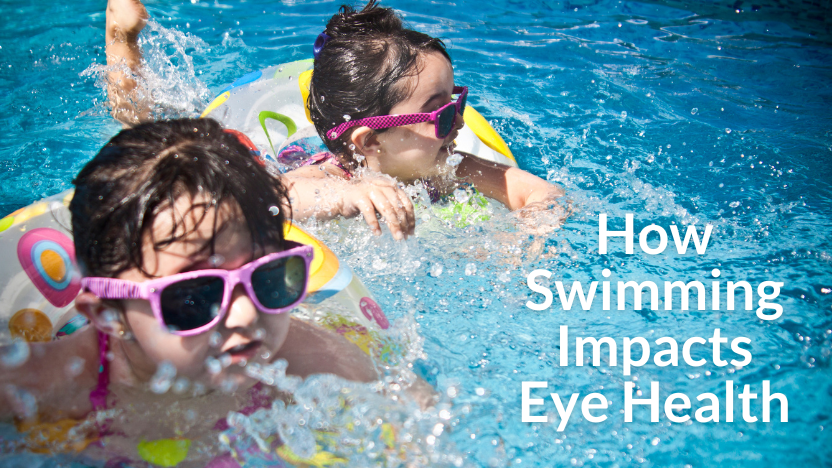Swimming’s Impact On the Eyes
Posted by EyePromise on Aug 8th 2024
Swimming is one of the most popular Olympic sports to watch. It’s also a common summertime activity, with people flocking to pools, lakes, rivers, and oceans to beat the heat. While it’s an admired pastime, swimming has been known to have a few negative effects on the eyes.
Chlorine
Specifically for those swimming in pools, the chemical used to clean pools called chlorine can cause several issues with the eyes. Some common symptoms include redness, burning, and temporary blurred vision. Additionally, when chlorine combines with sweat and other body oils, dirt, or urine, it creates chloramines, chemical compounds that can irritate the eyes and lungs. This chemical reaction can happen rather quickly in normal swimming temperatures, but it takes longer in colder water.
Bacteria

Whether you’re swimming in pools, lakes, rivers, or oceans, you’re exposed to hundreds of different bacteria. Most people believe that swimming in chlorinated pools is the “cleanest” option, but some bacteria, like the kind that causes conjunctivitis (pink eye), can survive chlorine. Your risk of infection increases if you wear contact lenses in the water.
Occasional Dry Eye
Occasional dry eye is an eye health issue that occurs when the eye can’t maintain lubrication and comfort. Swimming can wash away one or more layers of tear film, the watery shield that protects the cornea and keeps the eye hydrated and happy. When the tear film is unable to function properly (either produce enough tears or quality tears), you can experience symptoms like:
- Irritation
- Redness
- Dryness
- Grittiness
- Itching
- Burning
- Blurred vision
- Feeling of a foreign particle in the eye
Occasional dry eye is a common symptom of frequent swimming, but that’s not the only cause. Learn more about occasional dry eye.
Ultraviolet Damage

An infamous character in many people’s summer stories is ultraviolet (UV) light from the sun. This invisible light can be harmful to the body with short- and long-term exposure, causing issues like sunburn, photoallergic reactions, and even immune system suppression. Water can intensify these harmful light wavelengths, increasing the risk for damage.
For the eyes, exposure to UV rays can lead to cataracts, snow blindness, or photokeratitis. Snow blindness is another term for a corneal sunburn and causes temporary vision loss. Photokeratitis is a painful eye health concern that also occurs due to UV exposure and causes blurry vision, tearing, headaches, and sensitivity to light.
How to Protect Your Eyes and Still Enjoy a Swim
Avoiding swimming altogether seems like an impossible ask, especially with climbing temperatures. Here are a few ways you can protect your eyes while still enjoying a refreshing dip.
Stay Hydrated.
Maintaining adequate hydration is critical for a healthy, happy life, but it’s especially important during the hot summer months and even more so when swimming. Believe it or not, being in water is still a workout, and it can deplete your body’s water reserves and dry out your eyes and skin. Make sure you add another cup (8 ounces) of water to your daily intake for every 15-20 minutes of activity.
Wear Goggles/Sunglasses.
Wearing a well-fitted pair of goggles protects your eyes from ever making contact with the water you’re swimming in. This limits its ability to impact the eyes and, therefore, limits your risk. While goggles do limit exposure, it’s still recommended to remove contact lenses prior to swimming. If your prescription is severe enough to impair vision without correction, you can get prescription goggles from your eye doctor.
To protect your eyes from UV exposure, a good pair of sunglasses with full UV spectrum protection is what you’ll need. You can get prescription sunglasses from your eye doctor, as well, but the protection only works if you wear them!
Shower Before and After Swimming.

While it doesn’t need to be a full-on shower with soap, shampoo, and conditioner, showering after swimming can help rinse any contaminants off before they have the chance to cause issues. Because your natural oils can interact negatively with chlorine, it’s also recommended to shower before swimming in a pool. It’s less necessary before entering a lake, river, or ocean.
Take Regular Breaks and Limit Exposure to Chlorine.
The longer you swim, the higher your chances of experiencing any of the above concerns. Taking frequent breaks allows your body to rest, recover, and return to “baseline.” Additionally, limiting exposure to chlorine can help keep the tear film balanced and the eyes comfortable.
Use Eye Drops.
For fast relief of symptoms like dryness, irritation, or burning due to swimming, over-the-counter eye drops can be a great solution. A few drops intermittently throughout the duration of the swim can help ward off those occasional dry eye symptoms, but it won’t reduce risk of bacterial infection. Additionally, relief is usually temporary, so if the issues persist, see the next section.
Eye Vitamins for a Healthy Tear Film
Ensuring your tear film is healthy and stable prior to any swimming activity can help you avoid the ocular discomforts we shared earlier. EyePromise®, the eye vitamin brand of choice for eye doctors and professional athletes, worked with industry experts to create a clinically backed eye vitamin formula designed to support and maintain healthy tear production.
With high-quality, potent ingredients like Omega-3s, Vitamin A, green tea leaf extract, evening primrose oil (which contains GLA), and turmeric root extract, EyePromise EZ Tears™ soothes occasional dry eye symptoms from the inside out, and it works fast. In fact, EZ Tears is backed by a 30-day, money-back, satisfaction guarantee, so you can try it risk free!
Swimming is an exciting sport and an all-around fun summertime activity, but only when you’re staying safe. Use the above suggestions to help you and your family avoid these summer setbacks.


